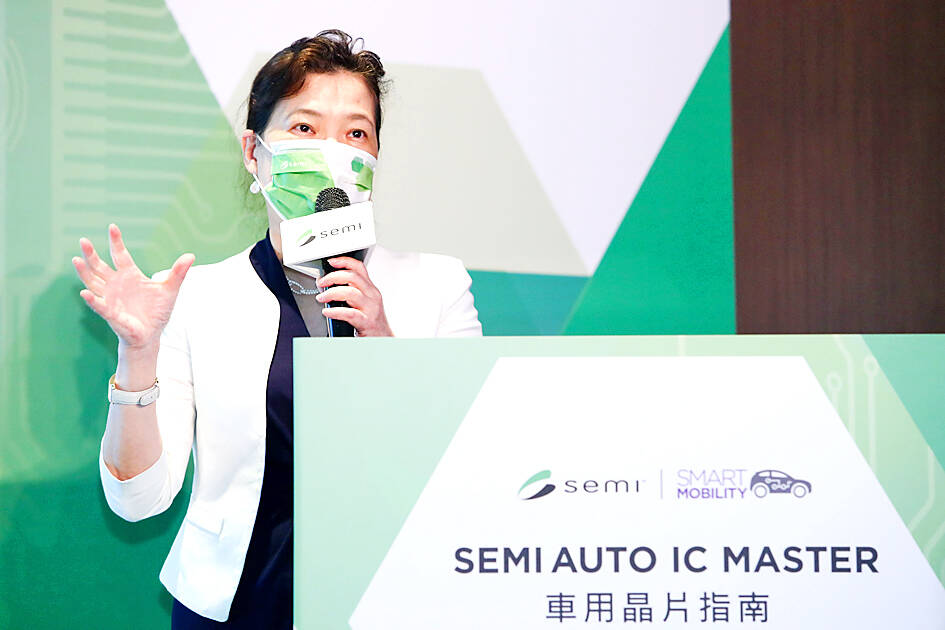Minister of Economic Affairs Wang Mei-hua (王美花) on Saturday returned from Japan, where she held talks on bilateral cooperation, including on semiconductors and electric vehicles (EVs), the Ministry of Economic Affairs said.
Wang arrived in Japan on Aug. 28 to witness the signing of a semiconductor supply chain partnership memorandum of understanding between the Taiwan-Japan Industrial Collaboration Promotion Office and Japan’s Kumamoto Prefecture.
The office and the prefecture would also collaborate on cross-field innovation development, the ministry said.

Photo: CNA
Japanese semiconductor production material and equipment suppliers have been keen to invest in Taiwan, it said, citing a plan by Sumco Corp, the second-largest silicon wafer maker in the world, and Formosa Plastics Group (台塑集團).
The two companies have agreed to invest NT$28.2 billion (US$921.93 million) on a 12-inch silicon wafer plant in Yunlin County’s Mailiao Township (麥寮). Production is scheduled to start in 2024.
Taiwan Semiconductor Manufacturing Co (TSMC, 台積電) and two Japanese firms also plan to build a fab, which is scheduled to start mass production in 2024, the ministry said.
The fab would manufacture specialty chips using TSMC’s mature 22-nanometer and 28-nanometer technologies.
Taiwan leads its peers in the development of high-end semiconductor technologies, and if Japan’s semiconductor production material and equipment suppliers continue to cooperate with Taiwan, the two countries could bolster their competitive edge in the global market, Wang said in a statement.
To boost bilateral ties, Wang visited the Japan Business Federation, a major business group, and several enterprises, including Sumco, Canon Inc, power supplier Jera Co, Mitsui Chemicals Inc, Panasonic Corp and IT solution provider NEC Corp.
Asked by the Japanese firms about a talent shortage in Taiwan, Wang promised to expand talent exchanges and training between Taiwan and Japan to ensure that the semiconductor supply chain is more resilient.
Taiwan excels in IC design, as well as electronics hardware and software development with respect to intellectual property rights, Wang said.
It can also respond promptly to sudden market changes, enabling the nation to produce critical components for EV use, she said.
Taiwan and Japan could aim for a larger share of the global smart EV market through cooperation in automotive electronics, smart cabins and 5G and the Internet of Vehicles connections, she added.
Wang is also eyeing business opportunities in carbon reduction amid the government’s goal to reach net zero emissions by 2050, the ministry said.
During her visit, she explored the use of hydrogen power to reduce thermal power generation and cut carbon emissions in Taiwan.
The promotion office was established by the ministry in March last year to accelerate the pace of industrial cooperation between Taipei and Tokyo.
Japan and Taiwan have since bolstered their cooperation in semiconductor development, the ministry said.

CHAOS: Iranians took to the streets playing celebratory music after reports of Khamenei’s death on Saturday, while mourners also gathered in Tehran yesterday Iranian Supreme Leader Ayatollah Ali Khamenei was killed in a major attack on Iran launched by Israel and the US, throwing the future of the Islamic republic into doubt and raising the risk of regional instability. Iranian state television and the state-run IRNA news agency announced the 86-year-old’s death early yesterday. US President Donald Trump said it gave Iranians their “greatest chance” to “take back” their country. The announcements came after a joint US and Israeli aerial bombardment that targeted Iranian military and governmental sites. Trump said the “heavy and pinpoint bombing” would continue through the week or as long

TRUST: The KMT said it respected the US’ timing and considerations, and hoped it would continue to honor its commitments to helping Taiwan bolster its defenses and deterrence US President Donald Trump is delaying a multibillion-dollar arms sale to Taiwan to ensure his visit to Beijing is successful, a New York Times report said. The weapons sales package has stalled in the US Department of State, the report said, citing US officials it did not identify. The White House has told agencies not to push forward ahead of Trump’s meeting with Chinese President Xi Jinping (習近平), it said. The two last month held a phone call to discuss trade and geopolitical flashpoints ahead of the summit. Xi raised the Taiwan issue and urged the US to handle arms sales to

BIG SPENDERS: Foreign investors bought the most Taiwan equities since 2005, signaling confidence that an AI boom would continue to benefit chipmakers Taiwan Semiconductor Manufacturing Co’s (TSMC, 台積電) market capitalization swelled to US$2 trillion for the first time following a 4.25 percent rally in its American depositary receipts (ADR) overnight, putting the world’s biggest contract chipmaker sixth on the list of the world’s biggest companies by market capitalization, just behind Amazon.com Inc. The site CompaniesMarketcap.com ranked TSMC ahead of Saudi Aramco and Meta Platforms Inc. The Taiwanese company’s ADRs on Tuesday surged to US$385.75 on the New York Stock Exchange, as strong demand for artificial intelligence (AI) applications led to chip supply constraints and boost revenue growth to record-breaking levels. Each TSMC ADR represents

Pro-democracy media tycoon Jimmy Lai’s (黎智英) fraud conviction and prison sentence were yesterday overturned by a Hong Kong court, in a surprise legal decision that comes soon after Lai was jailed for 20 years on a separate national security charge. Judges Jeremy Poon (潘兆初), Anthea Pang (彭寶琴) and Derek Pang (彭偉昌) said in the judgement that they allowed the appeal from Lai, and another defendant in the case, to proceed, as a lower court judge had “erred.” “The Court of Appeal gave them leave to appeal against their conviction, allowed their appeals, quashed the convictions and set aside the sentences,” the judges